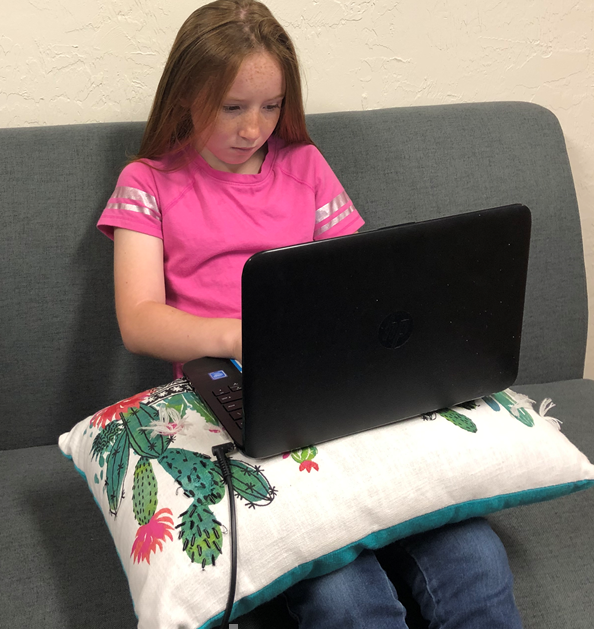
As the COVID-19 pandemic forced the statewide shutdown of school campuses, Riverside Christian School principal Ginny Keith knew she’d have to act quickly to develop a game plan for distance learning.
“I didn’t know much about technology,” admitted Keith, principal of the 140-student K-12 school in Trenton, Florida, at the heart of rural Gilchrist County. Half of the students receive a Florida Tax Credit Scholarship for lower-income and working-class families; three attend on a Gardiner Scholarships for students with unique abilities. Both programs are administered by Step Up For Students, which hosts this blog.
Keith took a leap of faith and asked for help from what some would consider an unlikely ally: public school district staffers who made it possible for Riverside to be up and running with a distance learning program that included live online instruction.
Joe Mack Locke, who works in IT for the Levy County School District, didn’t hesitate to come to Riverside’s assistance.
“It doesn’t matter if they’re my kids or Dixie County kids or Gilchrist County kids,” Locke told Keith.
Gilchrist County and its closest neighbors, Levy and Dixie counties, form a close-knit rural community where ties are strong, especially among educators. Riverside teacher Donna Goodson-King used to work with Locke in the Dixie County School District and once taught Locke’s daughter at a district high school. She also was married to Locke’s late cousin. So naturally, Goodson-King reached out to Locke when the school needed help.
“Education is a family in itself,” Goodson-King said.
With his school district’s approval, Locke helped set up Riverside’s Google infrastructure. A former colleague of Goodson-King’s from another neighboring county volunteered to teach staff how to use Google resources.
“Educating children is educating children, and we’re going to help them no matter who they are,” said Locke, who spent 17 years working in IT for the Florida Department of Corrections and saw firsthand the consequences of a poor education. “I’m in technology, but my job is to educate children using technology.”
Keith and her team soon were ready to launch. Count parent Judy Parks among the grateful.
“Everything is going pretty smoothly, and everyone is going with the flow,” said Parks, whose son, Kody, 15, and daughter, Miley, 10, attend Riverside, where Parks works as the school secretary.
The school uses a curriculum called Accelerated Christian Education Paces, which allows students to work at their own speed in each subject. Teachers initially gave quizzes along with a pre-test and a test for each unit but dropped the quizzes because they became too much to keep up with. Tests are given orally to remove any temptation for students to be less than rigorously honest.
Each school day, the Parks kids wake up, eat breakfast, make their beds, and then start their school day. Classes at Riverside are self-contained for younger students, while a small team of teachers educate students in higher grades. Attendance is taken by requiring each student to check in with his or her assigned teacher each day by Facebook, text or email.
The method doesn’t really matter, Keith said; turning in assignments also serves as proof of attendance. Those who haven’t been heard from by 3 p.m. each day get a phone call, she added.
Teachers host live teleconferences on Zoom and Google Meet and communicate via text or FaceTime.
“The teachers are available any time throughout the day and that makes it a blessing,” Parks said.
The live instruction has been the biggest hit with the kids.
“They can see one another, and they just get excited to see their friends and be social for a few minutes,” she said.
Locke, who also is a representative for Fellowship of Christian Athletes, isn’t stopping there. He’s now helping Riverside form its own FCA chapter.
“Whether these kids are living in your community, if you’re an educator, you don’t care,” Keith said. “They’re all our kids.”


